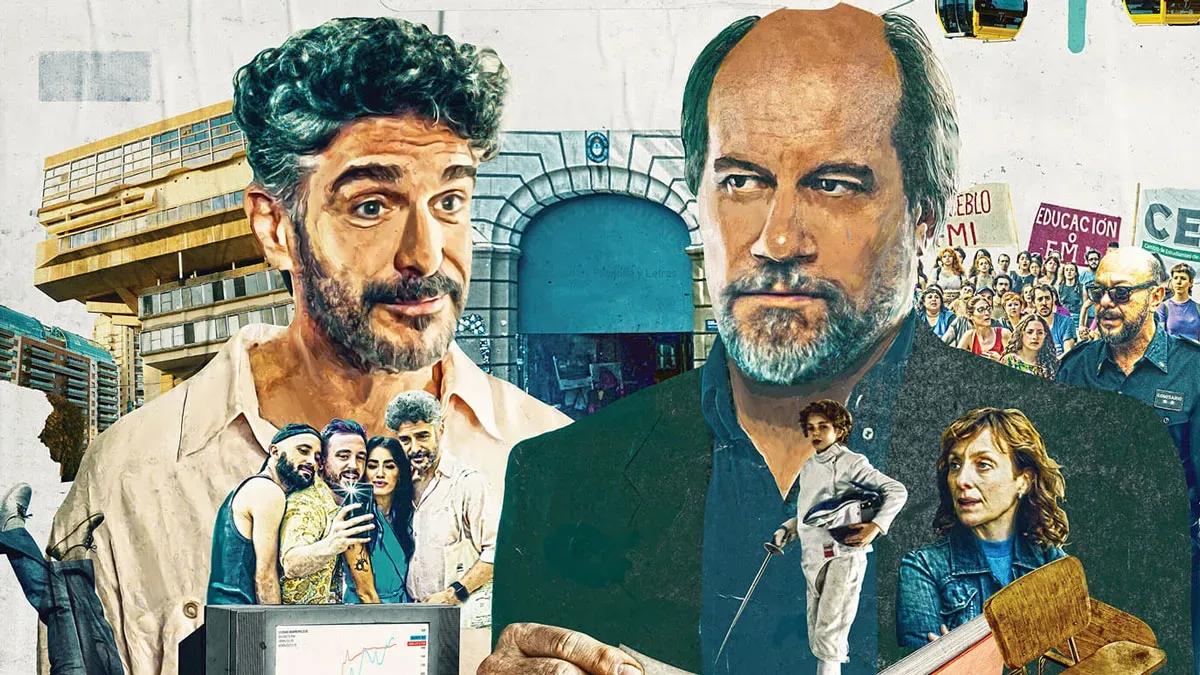The classrooms will reopen this month. It will be the second semester of the year with a crisis that, although it has been ongoing for several years and did not improve under any of the recent governments, worsened this year when the budget was frozen, putting the semester in jeopardy. The demands highlighted in the historic march of April 23, with UBA at the forefront, managed to reach an agreement with the current government to cover operating expenses (first delivered to UBA and later to the rest of the national universities) and part of the salaries of teaching and non-teaching staff, 90% of the educational budget, although these are well below inflation.
A few years ago, this situation seemed utopian since there was a broad consensus in the community that education was central to a country that lives from crisis to crisis and is in an increasingly deeper divide. Puan, the Movie by María Alché and Benjamín Naishtat tells what it means to be part of the puanner universe in an absurd way and what teachers and non-teaching staff experience in the economic crisis.
Two philosophers, two opposing ideas.
The movie begins with the death of Eduardo Caselli, the head of one of the subjects in the Philosophy program at the Faculty of Philosophy and Letters. It seems that Marcelo Pena (Marcelo Subiotto), a long-time member of the faculty located on Puan street, will be assigned the position. He is the professor who has been there the longest and the historical right-hand man of Caselli, even from his student days. His life revolves around philosophy. Besides UBA, he goes to poor neighborhoods to teach classes and also educates a lady from high society, showing that the interests of this study transcend social classes. He cannot imagine his life outside Puan. It is the only place where he feels he is someone and he clings to it no matter what happens. Despite being highly regarded by his colleagues, he is not by the deans and rectors of the university. Like all teaching and non-teaching staff at UBA, his salary deposits are delayed and he experiences the harsh reality of the country's economic crisis firsthand despite having several jobs as a professor. However, every protagonist has an antagonist, and his is Rafael Sujarchuk (Leonardo Sbaraglia).
Sujarchuk lives a completely different reality from his colleagues; he didn't even reside in Argentina. After finishing his studies, he moved to Germany where he is, unlike Pena, highly recognized both publicly and economically, allowing him not to understand a day in the life of a teacher in Argentina. His return to the country happens because he starts dating actress Vera Motta (Lali Espósito) and participates in the tribute to Castelli, who was his professor when he was a student and a classmate of Marcelo. Although he only gave a masterclass in a large lecture hall, he sees the opportunity to compete against his colleague, further fueling their mutual interest. Sujarchuk is a charismatic person with a speech that can convince everyone, and his recognition gives him an advantage over the protagonist to secure the position.
The story centers on this bureaucratic dispute, and both will try to do everything possible since the other also desires it. Even crossing moral boundaries.
When reality mimics fiction.
To make a movie that delves into Argentine society, it's impossible not to address the economic crisis, which in this case, directly affects UBA. The directors depict a story that at that time seemed like it would never happen nor be imagined in the distant future, a possible closure of the University of Buenos Aires.
The Philosophy department is greatly affected by the budget, and Sujarchuk seems to be the answer: his “Frankfurt aura” and international renown seem like the hierarchical leap needed to be heard. The prioritization of foreign over national also seems to be the answer in Puan, and Pena believes he is the only one who can compete with him to respect his mentor's legacy and the sense of belonging.
Additionally, from a comedic touch, an acquaintance of Pena’s partner meets someone from the Central Bank through a dating app who provides information about the systematic flight of dollars from the bank with a UBA sinking deeper into crisis. Although the crisis intensifies more and more, it is not the center of the story until the protagonists' rivalry is resolved.
No one is saved alone.
At the end of the movie, the protagonists meet to settle their differences at Socrates Café, a historic place for Puan students. Sujarchuk secured the position, but he needs Pena since he realizes that this is not Germany, but quite the opposite: living in Argentina is not at all easy, especially for someone who had been accustomed to the European dynamic with many more resources for over twenty years. Marcelo agrees to collaborate and form a duo in the theoretical courses, but it seems that the promises will not be fulfilled. The news is devastating: there is no money for the remainder of the semester, and UBA must close indefinitely.
Marcelo doesn’t hesitate and comes to the rescue of his passion and all the students who dreamed of graduating, proving that the faculty was much more than an educational institution. The university is a reflection of the identity of all students. His love leads him to lead a protest so that the government provides a response to the educational entity and holds a public class with the help of teachers and students, showing that no one is saved alone, especially not in this country. The plan remains in the struggle, but he is arrested by the police and forced to go to Bolivia while leaving a legacy of national unity, a legacy beyond the classrooms.


Comments